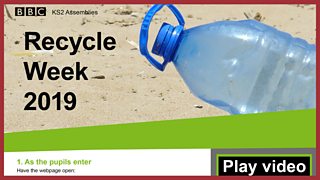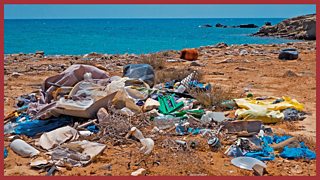Recycle Week
Themes: Recycling; caring for the planet; beautiful nature; pollution.
Summary: is supported by businesses and local authorities and aims to get everyone recycling more and to avoid unnecessary waste. Recycle Week, started by environmental campaign group WRAP, has been an annual event since 2002. This year Recycle Week runs 23rd-29th September. The problem posed by waste plastic is the particular focus of this assembly.
Resources: a picture of .
Key links
-
![]()
Download / print the framework ready for use
-
![]()
Click on the image to display full-size.
The video:

Martin Dougan reports for CΒιΆΉΤΌΕΔ Newsround on the pollution caused by plastic and in particular the 'trash islands' forming in places such as the Caribbean Sea.
Martin meets Richard, an expert trying to help us understand and deal with plastic pollution. Richard explains that the plastic we throw away often finds its way into the sea, where it can kill the fish, seabirds or other animals that get trapped in it or try to to eat it. Tiny, invisible bits of this plastic end up in our bodies too, when we eat fish or seafood. The warning is stark: 'Within the next 30 years the amount of plastic in our oceans could outweigh the fish.'
However, there are ways we can help solve the plastic problem by recycling when we can and choosing other materials when appropriate.
Duration: 02' 29"
Final words: 'And of course, recycle whenever you can.'
Video questions
Before we used plastic bottles, what did we put milk or fizzy drinks in?
Bottles made of glass
How many tonnes of plastic do we use each year?
300 million tonnes
What percentage of the plastic produced is used only once?
40%
What four things mentioned in the video are made of plastic and normally used only once?
Plastic straws
Crisp packets
Bottles
Carrier bags
How many sea turtles have eaten plastic by mistake?
Scientists believe 1 in 3 turtles has eaten plastic by mistake
Suggested framework
| Content | Guidance |
|---|---|
| 1. Entry music | You could play the sound of the sea (search online for 'ocean sounds') or try ΒιΆΉΤΌΕΔ Earth, 'Ten Hours of Relaxing Oceanscapes' (from the Related links section below) or the ΒιΆΉΤΌΕΔ publicly-available sound effects library (again, see Related links below). |
| 2. Introduction | Display the image of plastic waste on the seashore. Encourage pupils to identify different items. How many different plastic objects can they spot in the rubbish? What else do they think might be there? Ask: 'How do you think all these things got to the beach?' Gather pupils' responses and establish that, unless we take care, a lot of what we throw away finally ends up in the sea. Much of this rubbish, especially plastic, will stay around for hundreds of years unless we do something about it. |
| 3. The video | Play the video. The duration is 02' 29" and the final words are: 'And, of course, recycle whenever you can.' |
| 4. After the video | Tell the assembly: 'CΒιΆΉΤΌΕΔ Newsround reports that we use more than 35 million plastic bottles in the UK every day. If that is correct, how many plastic bottles would this add up to in one year?' Invite pupils to use a calculator to work out the answer. They may find their answer is too big a number to be displayed in the usual way. Experts think that only around half of these bottles ever get recycled. Ask your calculator-bearing pupils to divide their enormous number by two: it's still an enormous number. Tell the assembly: 'Now many of these bottles may get used lots of times, so we can't be sure of the exact number of bottles we just use once. But clearly, we can do better.' |
| 5. Time to talk | Lead a discussion by posing questions such as: 'Why is recycling so important?' / 'What stops people recycling things?' / 'Why do we throw so much stuff away?' / 'How can we get everyone to recycle more?' You could suggest that as a follow-up to the assembly pupils (and teachers) explore the 'Recycling Knowledge' resources of the Recycle Now webpage in the Related links section below. Tell the pupils about Recycle Week: seven days in September when we take some time to think about recycling, why it's important and what we can do to be better recyclers. Ask: 'Is there something you could do to help recycle plastic or to reduce plastic waste?' Encourage pupils to suggest things they could do to. |
| 6. Opportunity to sing | If your assembly is to include a song this would be a good time for it. Suggestions from ΒιΆΉΤΌΕΔ collections below. |
| 7. Opportunity to reflect | 'Our world is full of beauty...full of animals...and trees...and plants...and great wide oceans. But it is fragile too and easily damaged. Today, let's all think of ways to keep our beautiful planet healthy and unpolluted, for the animals and plants and children of tomorrow.' |
| 8. Opportunity for prayer | Use your standard form of address ('Dear God', etc) and: βWe thank you for our beautiful world, with its animals and trees and plants and great wide oceans. We know it is fragile and easily damaged. Help us today to find ways to keep our beautiful world healthy and unpolluted, for the animals and plants and children of tomorrow. Amen.β |
Suggested songs
| Title | Collection | Significant words |
|---|---|---|
| 'Chain of love' (Video - see Related links) | All about our school, no 14 | 'For the children of tomorrow / We've got to make it a better place' |
| 'He's got the whole world' (Video - see Related links) | Come and Praise | 'He's got the plants and the creatures in his hand' |


